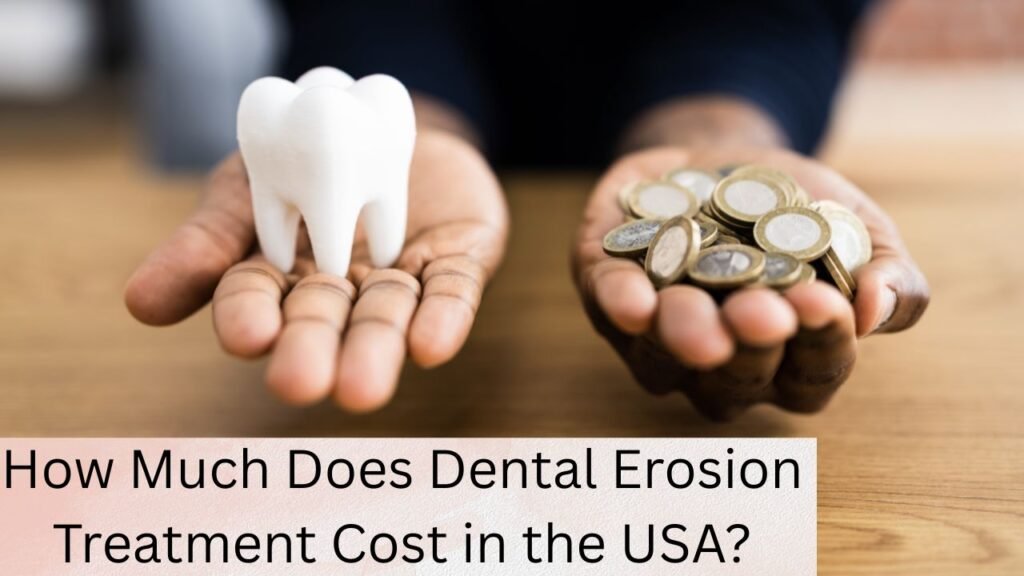🛑 Why Dental Erosion Shouldn’t Be Ignored
Dental erosion is a sneaky problem. It starts small—maybe a bit of sensitivity when you drink something cold or hot. But over time, acids from food, beverages, or even acid reflux can wear away your tooth enamel. That’s not just bad news for your smile; it’s also expensive if ignored.
In the US, treatment costs can vary wildly—from $50 for early preventive care like fluoride treatments, to $3,000 or more per tooth for serious restorative procedures like veneers or crowns. So, if you’re wondering how much does it cost to fix dental erosion, you’re already ahead of many. Understanding these costs now could literally save your teeth—and your wallet—later.

📊 Key Factors That Influence Dental Erosion Treatment Costs
Let’s break down what drives the price tag up or down:
| Factor | Impact on Cost | Examples |
|---|---|---|
| Severity of Erosion | More severe damage needs complex (and costly) treatment. | Mild: fluoride (~$100), Severe: crowns ($1,000+) |
| Treatment Type | Different solutions, different prices. | Bonding is cheaper than veneers or crowns. |
| Teeth Affected | More teeth = more cost. | One crown: ~$1,200; Multiple: $5,000+ |
| Dentist’s Experience & Location | High-end dental offices or urban clinics often charge more. | LA or NYC can cost 20–30% more than small towns. |
| Insurance Coverage | Some plans may not cover “cosmetic” erosion treatments. | Basic coverage for fluoride, not always for veneers. |
💰 Cost Range Summary
To keep it simple:
Dental erosion treatment in the USA can range from approximately $50 to over $3,000 per tooth, depending on the damage, treatment type, and location. Early action always costs less.
🧠 What Influences the Cost of Dental Erosion Treatment? (With Real Examples)
Let’s walk through the real-world cost implications of each factor.
🔹 Severity of Damage
- Early-stage erosion might only need a fluoride varnish or desensitizing paste, costing around $50 to $150.
- Moderate erosion, where enamel is visibly thinning, often needs dental bonding. Expect $300–$600 per tooth.
- Severe erosion, where the tooth structure is compromised, usually needs crowns or veneers, ranging from $900 to $3,000+ per tooth.
Real-world scenario: Catching erosion early with a $100 fluoride treatment could save you from needing a $1,200 crown later.
🔹 Type of Treatment
Here’s a deeper dive into common dental erosion treatment options:
| Treatment | Cost Range | Best For | Severity Treated |
|---|---|---|---|
| Fluoride Treatments | $50 – $150 | Strengthening enamel | Early |
| Desensitizing Toothpaste | $10 – $25 (OTC) | At-home sensitivity relief | Early |
| Dental Bonding | $300 – $600 per tooth | Patching enamel | Moderate |
| Porcelain Veneers | $900 – $2,500 per tooth | Aesthetic + protective fix | Moderate to Severe |
| Dental Crowns | $1,000 – $3,000 per tooth | Major damage restoration | Severe |
🩺 Are These Treatments Covered by Insurance?
Some treatments for dental erosion may be partially covered, especially if they’re considered medically necessary rather than cosmetic.
💡 Diagnostic codes to ask your dentist about:
- D1206 – Topical application of fluoride varnish
- D2391–D2394 – Composite fillings (by surface count)
- D2330 – Resin-based composite for front teeth
- D2740 – Full coverage crown (porcelain/ceramic)
- D2962 – Lab-fabricated veneer
👉 Pro tip: Ask your dental provider to pre-authorize treatments with your insurance. It helps to clarify coverage and avoid surprise bills.
🧾 Managing the Costs of Dental Erosion Treatment
Even without full insurance coverage, there are ways to reduce out-of-pocket expenses.
🔸 Financing & Discount Plans
- Dental discount plans can lower costs by 10%–60%, especially for procedures like crowns and veneers.
- Many clinics offer in-house payment plans with 0% interest for 6–12 months.
🔸 Negotiate or Bundle Treatments
- If you need multiple treatments (say, bonding on several teeth), ask your dentist if they offer bundled pricing.
- It’s okay to shop around—a second opinion could save you hundreds.
Real talk: Don’t be shy. Dentists are often willing to adjust pricing, especially if you’re paying cash or doing multiple teeth at once.
💸 Why Treating Dental Erosion Early Saves You Money
The longer you wait, the deeper your wallet needs to go. Here’s what early vs. late-stage erosion can cost:
| Stage | Likely Treatment | Estimated Cost (Per Tooth) |
|---|---|---|
| Early | Fluoride, bonding | $50 – $600 |
| Moderate | Bonding, veneers | $600 – $2,000 |
| Severe | Crowns, full restoration | $1,500 – $3,000+ |
🧠 Early action = Less drilling, less money, less stress.
❓ FAQ: Common Cost-Related Questions About Dental Erosion Treatment
Q: Is fluoride treatment always covered by insurance?
A: Often yes—especially for children. For adults, it depends on the plan. It usually costs under $150 out-of-pocket.
Q: What’s the most affordable way to treat mild dental erosion?
A: Fluoride treatments, desensitizing toothpaste, and dietary changes are low-cost and effective for early-stage cases.
Q: Is dental bonding worth it for erosion?
A: Absolutely. It’s less invasive and cheaper than veneers or crowns. Plus, it works well for moderate enamel loss.
Q: Are veneers or crowns better for severe erosion?
A: It depends. Veneers are more aesthetic, crowns offer full coverage. Crowns cost more but might be necessary for deeper damage.
🧾 Final Thoughts
Fixing dental erosion can feel overwhelming—not just medically, but financially. But knowing your options, asking the right questions, and acting early can make a huge difference. Whether you need a quick fluoride touch-up or a full smile restoration, understanding what you’re paying for and why is the first step to protecting your teeth—and your bank account.
Find Your Perfect Dentist
Easily book appointments with top-rated dentists in your area
Need Emergency Dental Care?
Get immediate help from verified dental professionals